#c: Prince Henry of Wales
Explore tagged Tumblr posts
Text
i cannot with this man

#nicholas galitzine#Lord of the Rings#LOTR#Orlando Bloom#ooc#SAY IT WITH YOUR CHEST GALITZINE#crack#Fandom: Red White & Royal Blue#c: Prince Henry of Wales#Henry: headcanon#Henry would do this too. that's my headcanon
143 notes
·
View notes
Text

ㅤㅤㅤHenry doesn't comment on Alex's concerns (the other man could never waste his time, but it's too telling of a thing to admit). He simply keeps playing through the melody of the song in half tempo, feeling out each note and harmonization as it comes. Slowed down, the Brit's appreciation deepens for the song Alex has written, swiftly turning to wonder. Hen's lingering smirk becomes a true smile, glancing over at the other musician to admire the way he seems immersed in his own lyrics.
ㅤㅤㅤAlex had been right, the song was too fast before. It needn't be slowed to a ballad, but something in-between could be remarkable, if he and Henry can just find that sweet spot. Coming to the end of the song, the Brit lets his fingers linger on the final chord, piano gradually fading out in its own time. He looks up at Alex with quirked eyebrows, "…. Alex, you must know this song is quite brilliant. I'm not just saying that, I truly think you've written something wonderful."
ㅤㅤㅤThe song could be huge, given the opportunity. If the right people hear it. And Henry is determined to ensure that the right people hear it, that Alex gets his shot at showing the world what he can do. He knows the other band doesn't really need his help to succeed, but sometimes... well. If Henry can use his own privilege to open even one closed door for someone as talented as Alex, he'll gladly do it.
Alex takes a moment to try and reign himself back in. His music means a lot to him, sure, but that shouldn't mean that his manners should suffer; Henry's doing him a favour, after all. The storm just isn't helping his mood, putting him right on edge with its ferocity - so much for productivity, then. Pulling a hand through his curls - and making them even more wild than they already were - Alex inhales and exhales with forced slowness until he feels steadier where he sits.
"It just seems too fast right now," the American murmurs, feeling like he needs to try and justify his opinion in front of the more experienced musician. Taking things note by note seems like a good idea, though; picking things apart into their smallest pieces is something he does regularly ( mostly to himself, if he's honest --- he's always been his own harshest critic ).
He's yanked out of his thought cycle by the way Henry says his name, by his smirk. It's honestly a little overwhelming to have that kind of one-to-one attention in such a small space - Alex flushes and glances away, fidgeting with the strings of his guitar. "Just feels like I'm wasting your time right now."
At the end of the day, though, they're both here to make music --- so when Henry begins to play the piano, Alex joins in with the beginning of the chorus of his song.
#leschanceux#thread: leschanceux78 (Band!Alex)#Fandom: Red White & Royal Blue#c: Prince Henry of Wales#Henry: threads#Henry :: verse :: Don't Let The Sun Blast Your Shadow#ic
6 notes
·
View notes
Photo
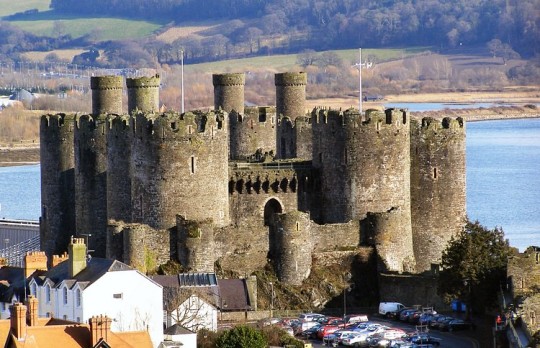
Conwy Castle
Conwy Castle (aka Conway Castle), located in North Wales, was built by Edward I of England (r. 1272-1307 CE) from 1283 to 1292 CE to protect and maintain, along with several other castles, his newly acquired dominance in the region. Built on a rock promontory, the castle incorporated the latest defensive design features such as massive round towers, a double courtyard or bailey, and outer barbican defensive walls and towers. Conwy Castle is listed by UNESCO as a World Heritage Site.
Edward I's Castle Building
From 1272 CE Edward I, the new king of England, conquered most of Wales and joined it with the county system present in England. Following the death of Llywelyn, the Prince of Wales, in 1282 CE, the only part of Wales which remained free was the wild mountainous north and here the king built several major castles which included Caernarfon Castle, Harlech Castle, and Conwy Castle. Work began on Conwy Castle in March 1283 CE and would continue over that decade, the vast team of labourers, masons, and craftsmen being supervised by Master James of Saint Georges (c. 1235-1308 CE), the experienced architect and engineer who had previously built castles in Europe and who would be involved in many of Edward's other Welsh castles.
King Edward selected as a suitable site for the castle a high rock perched above the estuary of the River Conwy on the east side and the Gyffin stream on the south side. Easily defended, the castle could then be supplied by the river in times of siege. However, as with his other castles, Conwy's position had a significance beyond mere defensive features as it was also the site of the Cistercian Aberconwy Abbey of Saint Mary, founded there a century before. The abbey was also the burial place of Llywelyn ap Iorworth, the prince who ruled North Wales and who is often called Llywelyn the Great (r. 1195-1240 CE). The Cistercian monks were obliged to move elsewhere (although Edward did pay for the move) and, once again, the English king appropriated a culturally significant site for his own message: a new order had begun.
Local limestone and grey sandstone were used (except for finely carved decorative elements), most of which came from a quarry right next to the town, greatly saving on costs as the transport of heavy materials was by far the most expensive part of building a medieval castle. Still, other materials such as lead, steel, iron, tin, and glass came from across the kingdom so that, altogether, the castle cost some 15,000 pounds (over $30 million today) to finish. It was money well spent, though, because Edward needed the castle for his own personal safety in the winter of 1294-5 CE. The Welsh uprising led by Madog ap Llywelyn resulted in an army besieging Conwy, and the castle could not be reinforced until the spring because of heavy floods. Edward was even obliged to share out his personal wine stock as the siege bit hardest in early 1295 CE. This was to be the only time Edward ever stayed at Conwy; perhaps he had bad memories of the siege and had no wish to ever return. In 1301 CE Edward had his son, the future Edward II of England (r. 1307-1327 CE) declared the Prince of Wales, and he received homage from his subjects in a ceremony at Conwy Castle. The castle then went through a period of neglect but was repaired in the second half of the 14th century CE.
The castle was famously used as a refuge of last resort by another king, indeed, the next royal person to stay there. This time it was Richard II of England (r. 1377-1399 CE) who, during his fight for the English throne with his cousin Henry Bolingbroke (future King Henry IV of England, r. 1399-1413 CE), used Conwy as his base. Richard was tempted to come out of the castle on 20 August 1399 CE by a traitorous adviser, and the king was promptly imprisoned in the Tower of London and then forced to abdicate by Parliament. The castle would see action again, this time in 1401 CE when it was captured during the Welsh rebellion led by Owain Glyn Dwr (c. 1359 - c. 1415 CE).
Continue reading...
34 notes
·
View notes
Text
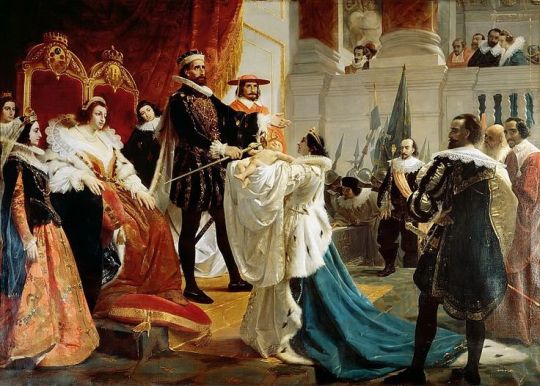
Henry IV Putting the Sword in the Hands of his Firstborn
Artist: Agostino Caironi (French, 1820-1907)
Henry IV of England
Henry IV (c. April 1367 – 20 March 1413), also known as Henry Bolingbroke, was King of England from 1399 to 1413. Henry was the son of John of Gaunt, Duke of Lancaster (a son of King Edward III), and Blanche of Lancaster.
Henry was involved in the 1388 revolt of Lords Appellant against Richard II, his first cousin, but he was not punished. However, he was exiled from court in 1398. After Henry's father died in 1399, Richard blocked Henry's inheritance of his father's lands. That year, Henry rallied a group of supporters, overthrew and imprisoned Richard II, and usurped the throne; these actions later contributed to dynastic disputes in the Wars of the Roses (1455–1487).
Henry was the first English ruler whose mother tongue was English (rather than French) since the Norman Conquest, over 300 years earlier. As king, he faced a number of rebellions, most seriously those of Owain Glyndŵr, the last Welshman to claim the title of Prince of Wales, and the English knight Henry Percy (Hotspur), who was killed in the Battle of Shrewsbury in 1403. Henry IV had six children from his first marriage to Mary de Bohun, while his second marriage to Joan of Navarre produced no surviving children. Henry and Mary's eldest son, Henry of Monmouth, assumed the reins of government in 1410 as the king's health worsened. Henry IV died in 1413, and his son succeeded him as Henry V.
#painting#british royal family#henry iv of england#narrative art#royal throne#interior#costume#men#women#queen#baby#sword#ceremony#british history#oil painting#fine art#agostino caironi#french painter#artwork#family#french art#european art
16 notes
·
View notes
Text

Pausing his investigation of the refrigerator's contents, Henry half turns to shoot Alex a rueful look. Hot Cheetos, he thinks incredulously. It's a miracle Americans have any stomach lining left at all...
Fortunately, Alex follows up with a far more reasonable suggestion, and Hen's expression brightens. The prince is still working on establishing his (nonexistent) skills in the kitchen, so a recommendation for takeaway comes as no small relief. Not to mention that some time spent out of the Brownstone would do them both good.
"That sounds brilliant, love." Henry says, swing the fridge closed and redirecting towards their living room, boiled kettle all but forgotten. "Let me just put on my shoes and grab my wallet."
He makes quick work of getting ready, pulling on a cashmere jumper over his button down for good measure. The seasons are changing in New York and Hen finds himself looking forward to the holidays in a way he hasn't since... well. Since his father passed.
Things just look brighter, with Alex at his side.
And speaking of... Henry emerges from the hallway in search of his boyfriend, still tucking his wallet into his trouser pocket while simultaneously holding up Alex's well worn leather jacket. "...all set? I thought we might sit on the sidewalk patio, do some people watching." Nobody masters scathing commentary on random strangers quite like Alex.
By some miracle, a great bit of effort, really, that's betrayed by the way his fingers fiddle with his notes, Alex manages to keep himself quiet as Henry speaks. It's praise, pure love, that still manages to surprise him even if they're variations of words and phrases he's heard from Henry before; after all this time, he's not sure he'll ever come to expect it and he's not sure he's want to, fearful of what'll happen should he start to take this enormous love for granted.
"I -" Alex fights against ingrained habit, the urge to argue and push back. He still wants to tell Henry that his assessment is partially incorrect. He'll never be sure if the effort, days and days of obsessive study with breaks only for other pressing assignments and readings, is purely driven by his own motivation to excel or because he knows he'll be judged against his parent's successes and failures. Sometimes, he thinks it'd be simpler to fail and be left with the pieces of broken expectations.
"Thank you," he says quietly. The words sound small compared to the passion Henry spoke with but Alex is exhausted, surprisingly exhausted like it's only caught up with how now, and sometimes showing strength is knowing when to let things be. He hopes this is one of them.
"I ate half of bag of hot cheetos," Alex proclaims proudly, forcing all the anxiety and the things he hasn't said into his voice. He sits up straighter, pushing his notes back, as he aims a megawatt smile at Henry's back.
"Actually," he draws out the word as he takes in the sight of Henry snooping through the fridge. "I think I could with some fresh air. And those pork dumplings a few block over sound amazing right now..."
#thread: fyrewalks02 (alex)#fyrewalks#c: Prince Henry of Wales#Fandom: Red White & Royal Blue#Henry: threads#Henry :: verse :: tbd#ic
7 notes
·
View notes
Text
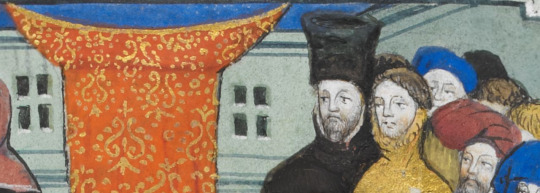

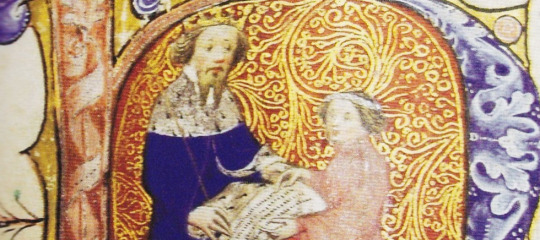

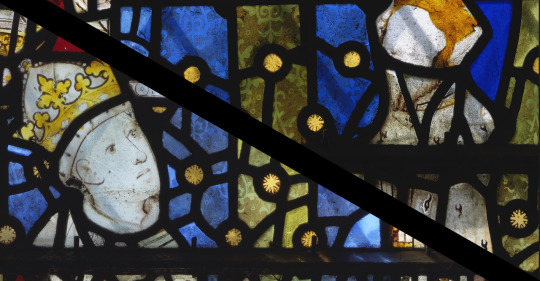

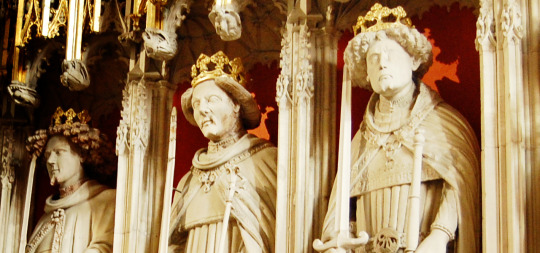
Father and Son
Henry Bolingbroke recognized as king by the parliament, his son the Prince of Wales beside him (BL Harley Ms. 1319 f.57r, detail) | Oscar Wilde, A Woman Of No Importance | Henry IV of England and his son, Henry, Prince of Wales (later Henry V), from the Great Cowacher of the dukes of Lancaster, c. 1402 (The National Archives, DL 42/1-2) | Ollie Schminkey, Dead Dad Jokes | Stained glass at York Minster, depicting Henry IV (right) and Henry V (left) | Sophokles, Elektra (trans. Anne Carson) | Kings Screen at York Minster, depicting (l-r) Richard II, Henry IV and Henry V
45 notes
·
View notes
Text
week #24 recommendation: rose
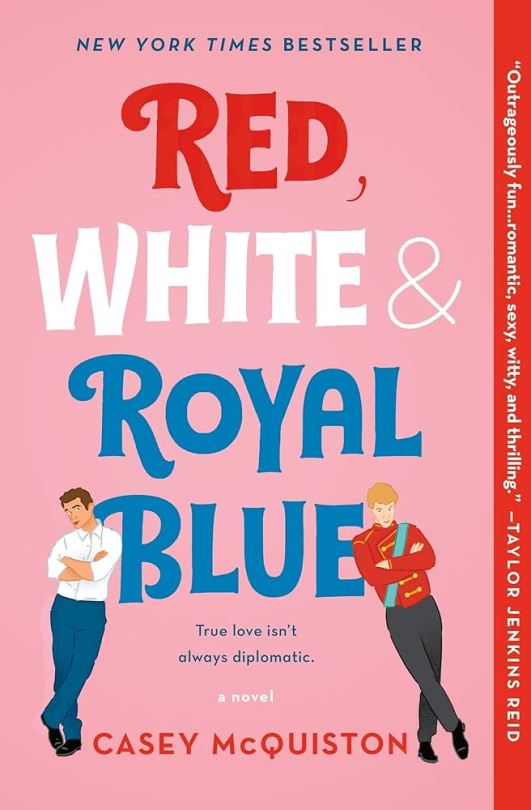
Red, White, & Royal Blue by Casey McQuiston
▪︎ romance novel ▪︎
alex and henry have never been friends, but they've always had to maintain an outwardly amicable relationship. because, you see, alex is the son of the president united states, and henry is the prince of wales. a public fight between them would probably make british-u.s. relations take a turn for the worse.
so when the two nearly come to blows at a wedding and knock over the extremely expensive cake in the process... well, let's just say that it's time for damage control. alex and henry have to establish a (fake) friendship, purely for the purpose of showing the world that it was just a huge misunderstanding. of course, alex still thinks henry is the stuffiest, fakest person in the world, and henry... really, only henry knows what henry thinks. but as the two are forced unravel things that keep them apart, they find they're not as different as they think. and maybe, just maybe, they're diving deep into something that takes them long past "just friends"—something which neither of them can turn away from.
▪︎
for as long as i've known a) what "gay" means, b) how to read, and c) that this book existed, i wanted to read it. i finally got around to it earlier this year, and i have to say—holy fucking shit. if i could leave it at that, i would. but. words. first off, this is, hands down, one of the best enemies-to-lovers romance novels out there. the witty banter, the ridiculous enemies-establishing-fight, that time they ended up in a closet together... ah, it's all beautifully written. and the progression from reluctant allies to friends to confidants to something more is perfectly slow and fast at the same time. and the forbidden romance. i literally have no words. nor do i really have much more to say about this, except: witty humor, tender emotional moments, general spiciness, and the best romance tropes out there. that's what you're getting into with this book. and it sure as hell is amazing.
#red white and royal blue#casey mcquiston#flowers wither gardens die#twice is nice#book recommendations#bookblr#books
6 notes
·
View notes
Note
Henry had hoped he’d been wrong, that it had just been paranoia preying on his mind. But now Bea is giving voice to his very fears, and the youngest prince cannot help how he tenses in her comforting embrace.
“..He can’t do that… can he??” Hen asks incredulously, sitting up slightly from where they're both slumped against the pillows. But then he thinks of the months their mother has spent in seclusion, her apathy in matters regarding the crown, how broken she has seemed since their father died…
Henry can hardly bear it, but it seems Philips is not so affected.
“He would hide us away, if he had his choice…” Hen mutters bitterly, shifting to look at Bea directly, “… act like we don't exist, rather than risk us embarrassing the Firm.”
"Philip's getting worse, isn't he..." Henry says it quietly, carefully, knowing how the walls have ears even here in Kensington Palace. He rests his temple on Bea's shoulder, their feet tucked together under the blankets of his bed, Bake Off a comforting white noise playing in the background. For now, it's just them, which means Henry can be honest in a way he can't be with anyone else.
He sighs, taking Bea's hand and fiddling with the rings on her fingers, "... he's starting to sound like Gran when he talks to me. If he talks to me."
Its so rare they get moments like this, or entire afternoons, and Bea is making the most of it, just getting to spend time with her favourite person. One arm is wrapped around Henry, her fingers playing with the strands of his golden hair, the other letting him play with the rings of her fingers as Bake Off plays in the background.
"I heard him talking yesterday," she murmurs in agreement, "ever since mum threatened to tell the council about granny, he's.... been getting worse." She moves a tad closer to her brother, if that's even possible, keeping her voice low. "Hen, I think there's a real chance he's going to try and force mum into abdication."
#f1rst prince#thread: f1rst prince02 (Bea)#Fandom: Red White & Royal Blue#c: Prince Henry of Wales#Henry: threads#ic#Henry :: verse :: tbd
4 notes
·
View notes
Text
LONDON
Hello friends! So beginning my trip to Europe, we landed in London at 12:30ish on May 23, 2023. After the unfathomably long plane ride, which I thankfully slept through, we were all exhausted, yet hopeful for the weeks ahead of us. The rest of that day was spent resting and mingling in the hotel.
The next day, we went to Hyde Park, a beautiful expanse of green space much like Central Park in New York City, although much older and history-rich. With its sprawling green and luscious plant life, the park was originally used as a hunting reserve by King Henry VIII, yes that one. Interestingly enough though, James I opened it to the public in the early 17th century, and since then it has been a sight of great popularity in London. One location of particular interest in the park is Speakers Corner, a set apart bit of the park specifically designated, by parliament, for free speech. Since its designation in 1872 due to a forceful takeover of the park by a men's suffrage group, the corner has been used by many free speakers in an attempt to rally change amongst the masses. In the early 1900's suffragettes used the corner as their place of protest. Since its designation many orators, such as Karl Marx, Vladimir Lenin, and George Orwell have used the corner to speak their thoughts. This sight has such specific value because it continues to hold captive peoples attention and birth reform where it is most needed. Also an interesting place to visit in the park is the Rose Garden, a beautiful, as the name would suggest, rose garden. The garden has a wide variety of flowers and plant life, and it is absolutely stunning to look at.
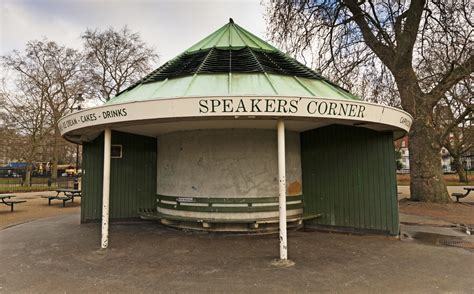
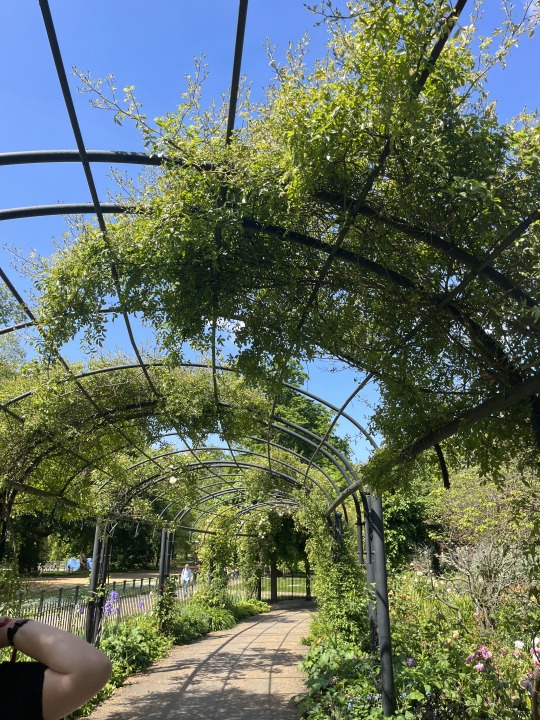
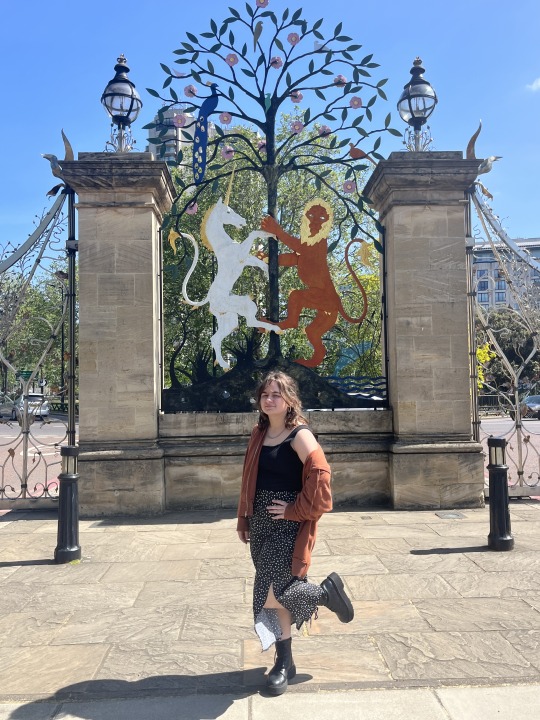
Westminster Abbey is another place I had the privilege to explore when in London. With its sprawling architecture and truly astounding number of graves, Westminster Abbey is set apart as one of the most beautiful and most disturbing buildings in London. Impressively, the Abbey is the final resting place to over 3000 native britons, but despite this, the Abbey has been the location of many coronations in the country's long history. "Since William the Conqueror in 1066, every British Sovereign has been crowned in the Abbey except for Edward V and Edward VIII, who were never crowned." (Britannica) For literally just under a millenium, british kings and queens have begun their official reign here. Also cool to note, royal weddings have been held in the abbey, the most recent of which was the marriage of William and Kate, the Prince and Princess of Wales in 2011. On an entirely different note, the Abbey is the final resting place of over 3,000 native britons, including William Shakespeare, C. S. Lewis, and Jane Austen. This fact seems super cool until you realise that the majority of the graves are part of the floor, requiring you to walk over them to get around the massive Abbey. Apart from the staggering number of graves in the Abbey, it is also home to beautiful stained-glass windows, most of which picture apostles, saints, or the Savior Himself. Westminster Abbey and its beautifully detailed architecture has been integral to the culture, society, and rulers of the United Kingdom for almost a thousand years, and it continues to have such significance in culture as well as religion. Christian worship has been held here for as long as the building has stood, and even today as people are touring the Abbey, occasionally a priest will come on the intercom and ask people to be still and silent while they pray. It is a holy place of solemn worship, even today.
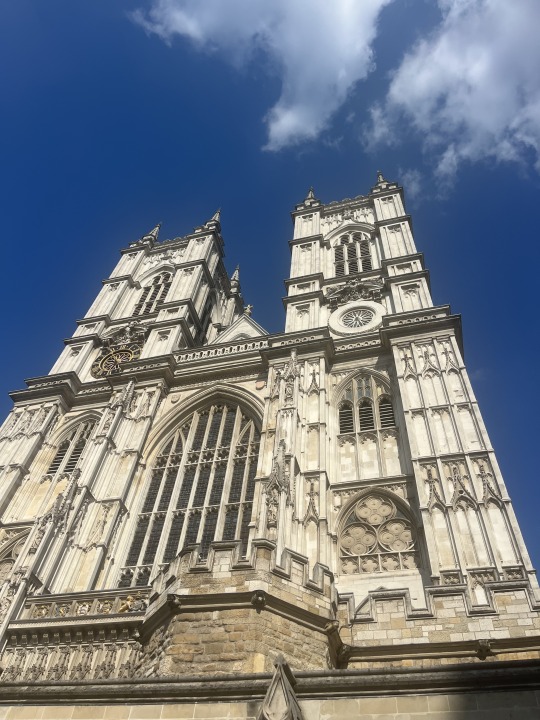
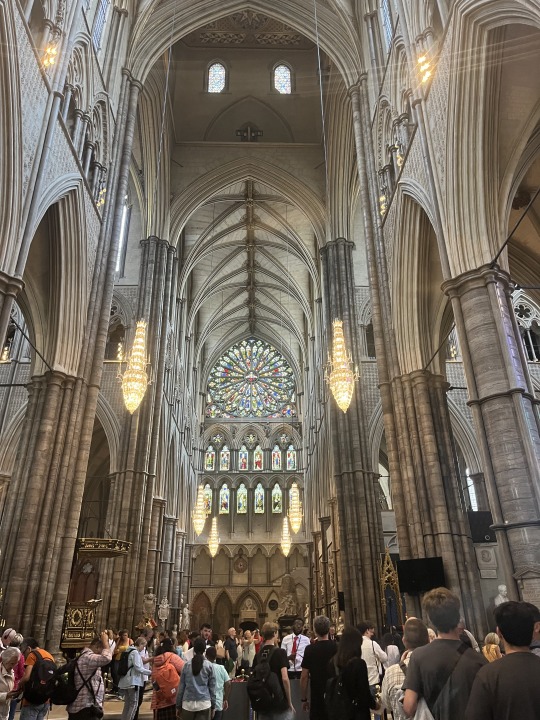
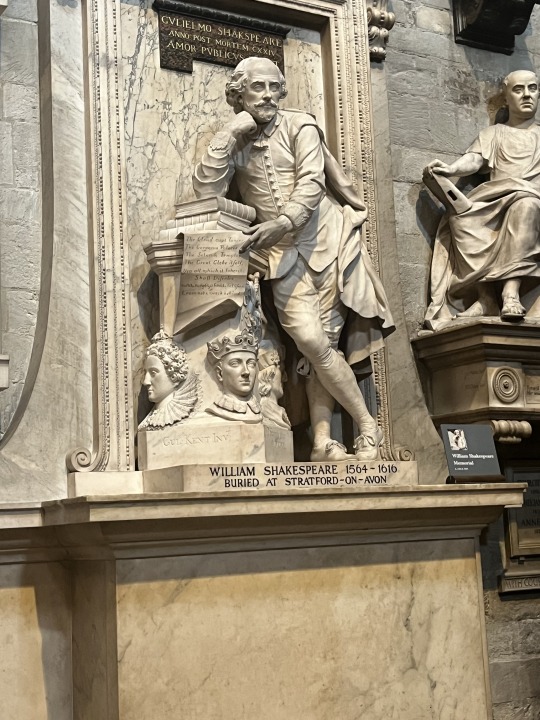
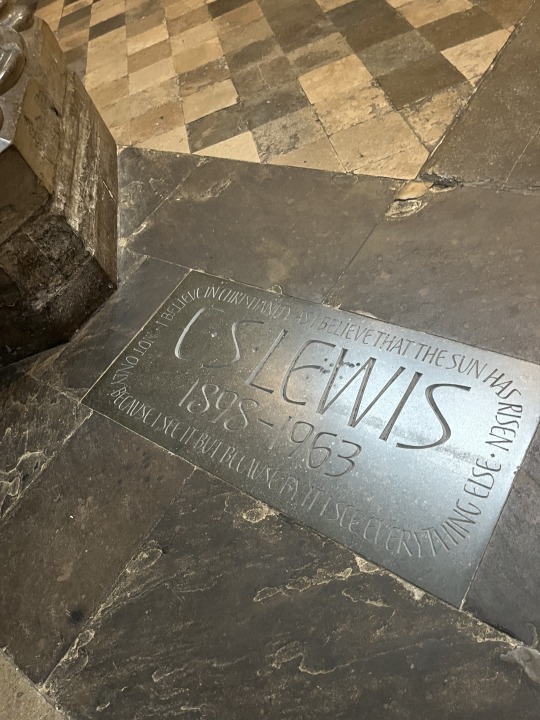
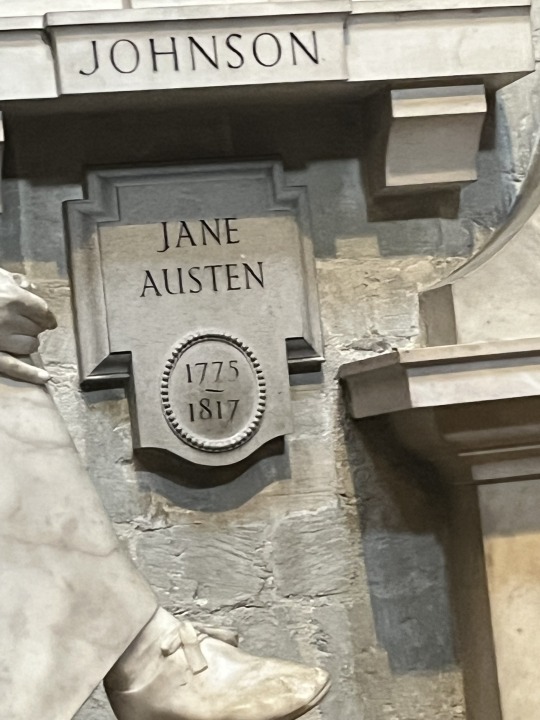
The final culturally significant location I visited was Big Ben and the House of Parliament. Just from an outside look, which is all the looks we got to have, the gothic-style spires and towers of the House of Parliament are one of the more eye-catching buildings in London, as it has been since its construction in the 11th century for Edward the Confessor. It was then expanded by William the Conqueror shortly thereafter. The building had been previously used as a palace until a fire in 1834, after which the palace was rebuilt in its current gothic style. Inside, the House of Lords and the House of Commons meet and make decisions for the country, which is why when we visited these buildings, there were small yet loud groups of protestors standing outside of it. Accompanying the House of Parliament is the famous, iconic, beautiful, Elizabeth's tower. Now you might be thinking, "wait, isn't it called 'Big Ben?'" No, dear reader, you silly goose, you. Big Ben refers to the bell inside of the tower, which is well known for its accuracy and loud toll on the hour, as most bells are. Elizabeth's Tower, and subsequently Big Ben, have been iconic structures seen in British centric pop-culture for ages, such as Peter Pan, V for Vendetta, and Enola Holmes. Overall, these two iconic buildings have been amongst the most recognizable buildings in all of history, but not only that, they have been the center of political circuits for generations.
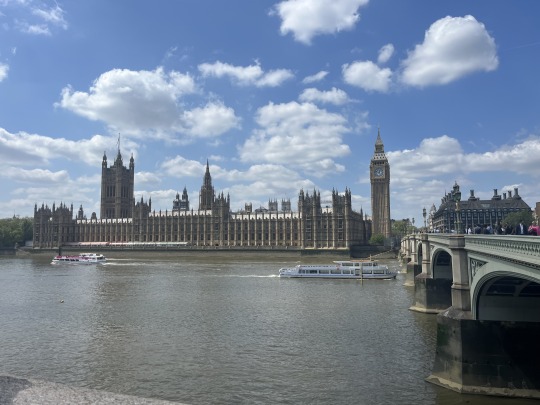
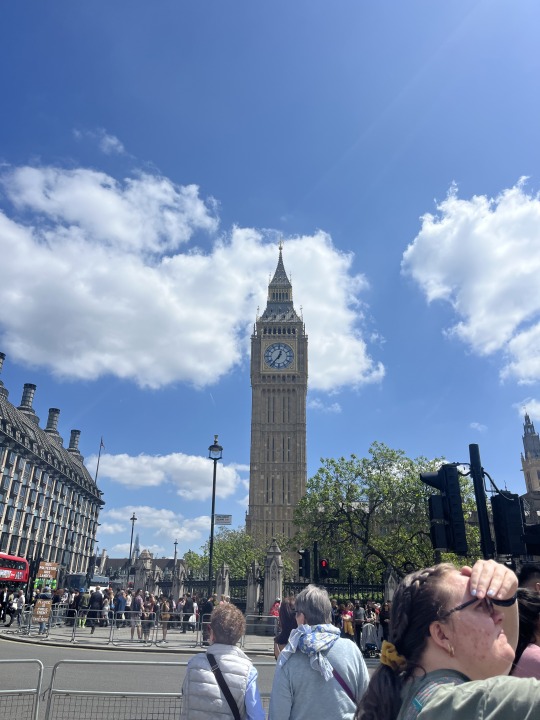
Overall, London was a beautiful whirlwind of history and awe, combined with the pure wonder of being able to walk or take public transit wherever you wanted to go. All these factors combined makes this city one of my top favorites of the trip.
2 notes
·
View notes
Text

#it's giving Joe/Nicky but also Alex/Henry#joe x nicky#alex x henry#lmao#Fandom: The Old Guard#c: Nicolo Di Genova#Nicky: headcanon#we are meant to find each other | Joe & Nicky#Fandom: Red White & Royal Blue#c: Prince Henry of Wales#Henry: headcanon#History huh? Bet we could make some | Alex & Henry#Fandom: The Hunger Games#c: Peeta Mellark#Peeta: headcanon
6 notes
·
View notes
Text
British Line of Succession
C. King Charles III
The Prince William, The Prince of Wales
Prince George of Wales
Princess Charlotte of Wales
Prince Louis of Wales
The Prince Henry, The Duke of Sussex
Prince Archie of Sussex
Princess Lilibet of Sussex
The Prince Andrew, The Duke of York
Princess Beatrice, Mrs. Eddo Mapple Mozzi
Miss Sienna Elizabeth Mapple Mozzi
Princess Eugenie, Mrs. Jack Brooksbank
Master August Philip Hawke Brooksbank
Master Ernest George Ronnie Brooksbank
The Prince Edward, The Duke of Edinburgh
James, The Earl of Wessex
The Lady Louise Alice Elizabeth Mary Mountbatten-Windsor
The Princess Anne, The Princess Royal
Mr. Peter Mark Andrew Philips
Miss Savannah Anne Kathleen Philips
Miss Isla Elizabeth Philips
Mrs. Zara Anne Elizabeth Philips Tindall
Miss Mia Grace Tindall
Miss Lena Elizabeth Tindall
Master Lucas Philip Tindall
2 notes
·
View notes
Text

ㅤㅤㅤThe gently spoken 'Baby' cuts through Henry's false bravado like a particularly sharp blade, leaving him stripped bare for the question that follows. He visibly deflates, eyes sliding away from where they watch Alex's lips on his knuckles.
ㅤㅤㅤIs that really what you want? He doesn't reply, knowing the answer must be written all over his face regardless.
ㅤㅤㅤ"It rarely matters what I want" Hen says finally, taking a measured breath, "...to my Grandmother, anyway." He lifts his gaze back to Alex, the lines around his eyes softening as he takes in the other man's earnest features, his glasses, the way his curls frizz slightly at the end of the day.
ㅤㅤㅤThe Prince's expression turns wistful... "She would have me come alone." Which isn't surprising, really. It's always been far easier for the Queen to browbeat Henry into compliance when he's isolated. And she would expect to have her exact wishes followed... to the letter.
ㅤㅤㅤWell. Perhaps the Prince cannot ignore such a summons. But that doesn't mean he has to play by Gram's rules...
ㅤㅤㅤTightening his fingers around Alex's own, Henry gives him a tender smile. He leans forward to rest their foreheads together, exhaling. "... I would love for you to come with me, Alex. If you can spare the time away from Uni, that is." He swallows. "It would mean a great deal to me..."
This... is not small potatoes; this is the potential loss of Henry's family ties and everything that goes with it ( it's kinda big potatoes, really ). But Henry doesn't seem to be too concerned yet --- perhaps the rumours are just rumours, the tabloids trying to stir up trouble on a slow news day. Or maybe he is - the way Henry's reaching onto his hands signals that something about this is playing on his mind.
Alex turns his palm face up, captures Henry's fingertips in his own and lifts them to his lips to press a kiss against each knuckle. He maintains eye contact even as he uses his free hand to shove his glasses back up his nose, giving Henry a small smile as he does.
"You want me to come with you?" If they went together, at least Alex would know how it all turns out. At least if they go together, it'll be harder for Henry to... disappear for some inexplicable reason. At least if they go together, he can hold Henry's hand through whatever shit the queen's cooked up.
"Baby," Alex begins with a pained expression; as much as he hates the British Monarchy ( and monarchies in general, actually ), he hates the idea of Henry being disowned and cut off from his family more. "Is that really what you want?"
#leschanceux#thread: leschanceux80 (Alex)#Fandom: Red White & Royal Blue#c: Prince Henry of Wales#Henry: threads#Henry :: verse :: In a Thousand Rooms; Nowhere at All#ic
5 notes
·
View notes
Text
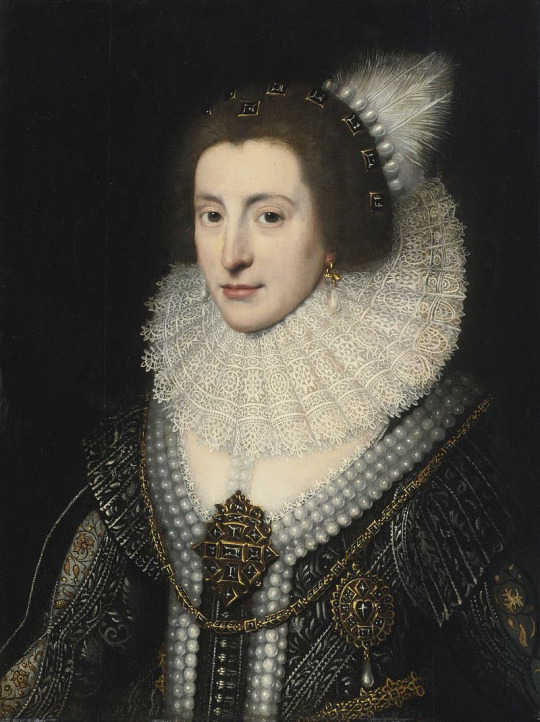
Elizabeth Stuart, Queen of Bohemia.
Portrait by the Workshop of Michiel Jansz. van Mierevelt, c. 1623.
Elizabeth was known as ‘the Winter Queen’, and her husband Frederick V as 'the Winter King’, due to their brief reign as monarchs of Bohemia. They were officially crowned in 1619, but were driven into exile after just one winter [Note: Henry VII, father of Henry VIII, was also known as 'the Winter King’. See documentary here.]
Her biographical details and regal connections are far too complicated to go into here - I suggest a read on Wikipedia and then further afield if you are sufficiently interested. Essentially, she was the second child and eldest daughter of James VI and I, King of Scotland, England, and Ireland, and his wife, Anne of Denmark, and became second-in-line to the throne when her elder brother, Henry Frederick, Prince of Wales, died at the age of 18 of typhoid fever. However, he was eventually succeeded by his younger brother, Charles, as Charles I, as mentioned in previous post here.
Elizabeth’s grandson by her daughter Sophia of Hanover succeeded to the British throne as George I, initiating the House of Hanover, when Queen Anne failed to produce any offspring despite 17 pregnancies.
ADD MORE INFO/EDIT.
2 notes
·
View notes
Photo
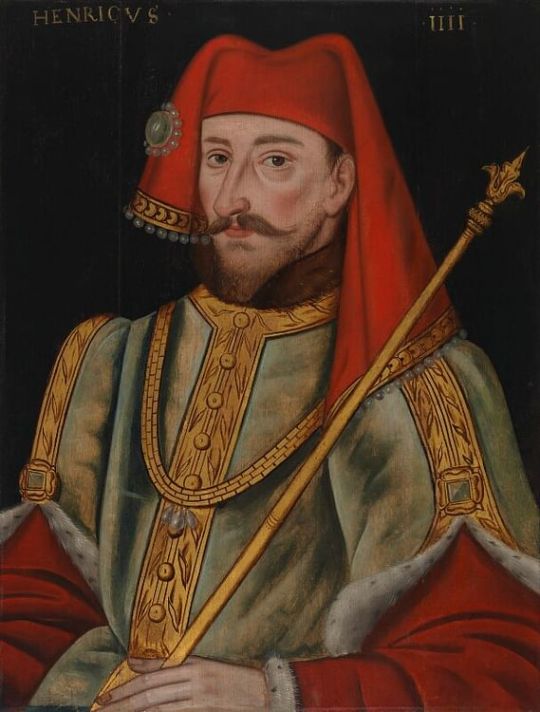
Henry IV of England
Henry IV of England ruled as king from 1399 to 1413 CE. Known as Henry Bolingbroke, Duke of Lancaster before he became king, Henry clashed with his cousin Richard II of England (r. 1377-1399 CE) and was exiled in 1397 CE. Returning to England with a small army in the summer of 1399 CE, Henry made himself king as Richard's support collapsed. Kicking off his reign with the murder of his predecessor, Henry would face major rebellions in both England and Wales, and he frequently clashed with Parliament, particularly the 'Long Parliament' of 1406 CE. Henry was the first of the kings from the House of Lancaster and he was succeeded by his son Henry V of England (r. 1413-1422 CE).
Birth & Family
Henry was born in April 1366 CE at Bolingbroke Castle in Lincolnshire, the son of John of Gaunt (l. 1340-1399 CE), himself the son of Edward III of England (r. 1327-1377 CE) and so a claimant for the throne of Richard II (who was the grandson of Edward III and the son of Edward the Black Prince, l. 1330-1376 CE). John was a powerful but unpopular figure who had been passed over for the throne because he had supported corrupt nobles and officials identified by Parliament. Henry Bolingbroke's mother was Blanche of Lancaster, daughter of the Duke of Lancaster. The young nobleman was given the title Earl of Derby, the first of many he would acquire over his career.
Henry married Mary of Bohun (b. c. 1369 CE) on 5 February 1381 CE, but she died during childbirth in 1394 CE. The couple's most famous son was Henry, future Henry V, born on 16 September 1387 CE. Henry, now king, married again on 7 February 1403 CE, this time to Joan of Navarre (l. c. 1370-1437 CE). Henry had a typical noble upbringing where he showed a flair for the medieval tournament, courage, piety, and an interest in literature. The young Henry had his share of adventure when he twice went to fight pagans in Lithuania as part of the long-running Northern Crusades (12-15th century CE) alongside Teutonic Knights. There would also be a pilgrimage to Jerusalem before he concentrated on his ambitions in England.
Continue reading...
18 notes
·
View notes
Text
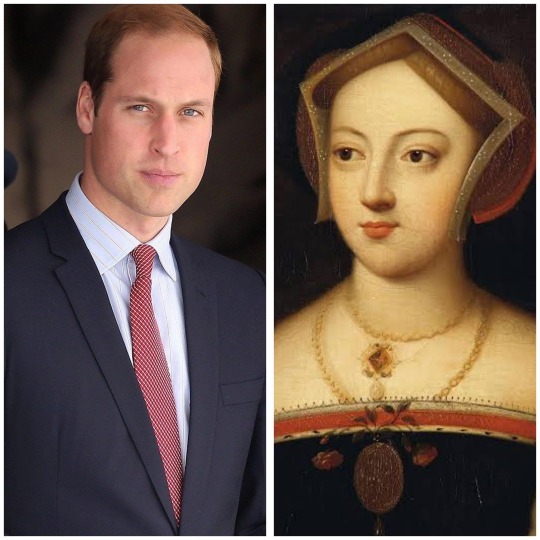
Prince William 👑 will be the first ‘Boleyn King’ from both sides of his family mother and father to become King of UK 🇬🇧👑👑👑
As he is a descended from Mary Boleyn through his father and via mother’s Spencer line, below you can see the genealogy line.
From the fathers line Charles III :
Mary Boleyn (d. 1543) m. William Carey
Catherine Carey (c.1524-1569) m. Sir Francis Knollys
Lettice Knollys (1543-1634) m. Walter Devereux, 1st Earl of Essex
Robert Devereux, 2nd Earl of Essex (1565-1601) m. Frances Walsingham
Frances Devereux (1599-1674) m. William Seymour, Duke of Somerset
Jane Seymour (1637-1679) m. Charles Boyle, 3rd Viscount Dungarvan
Charles Boyle, 2nd Earl of Burlington (d. 1704) m. Juliana Noel
Richard Boyle, 3rd Earl of Burlington (1695-1753) m. Dorothy Savile
Charlotte Elizabeth Boyle (1731-1754) m. William Cavendish, 4th Duke of Devonshire
Dorothy Cavendish (1750-1794) m. William Cavendish-Bentinck, 3rd Duke of Portland, Prime Minister
Lieutenant-Colonel Lord Charles Bentinck (1780-1826) m. Anne Wellesley (Lady Abdy)
Reverend Charles Cavendish-Bentinck (1817-1865) m. Carolina Louis Burnaby
Cecilia Nina Cavendish-Bentinck (1862-1938) m. Claude Bowes-Lyon, 14th Earl of Strathmore and Kinghorne
Elizabeth Bowes-Lyon, Queen Elizabeth the Queen Mother (1900-2002) m. King George VI
Queen Elizabeth II (1926- ) m. Prince Philip of Greece and Denmark, now known as Prince Philip, Duke of Edinburgh
Charles, Prince of Wales (1948- ) m. Lady Diana Spencer (1961-1997)
Prince William, Duke of Cambridge (1982- ) and Prince Harry, Duke of Sussex (1984- )
From mother Princess Diana Spencer Line :
Mary Boleyn (d. 1543) m. William Carey
Henry Carey, 1st Baron Hunsdon (1526-1596) m. Anne Morgan
Robert Carey, 1st Earl of Monmouth (c. 1560-1639) m. Elizabeth Trevannion
Thomas Carey of Sunninghill Park (d. 1634) m. Margaret Smith
Elizabeth Carey, Viscountess Mordaunt (1632-1679) m. John Mordaunt, 1st Viscount Mordaunt
Brigadier-General Lewis Mordaunt (d. 1713) m. Mary Collyer
Anna Maria Mordaunt (d. 1771) m. Stephen Poyntz
Margaret Georgiana Poyntz, Countess Spencer (1737-1814) m. John Spencer, 1st Earl Spencer
George Spencer, 2nd Earl Spencer (1758-1834) m. Lady Lavinia Bingham
Frederick Spencer, 4th Earl Spencer (1798-1857) m. Adelaide Horatia Seymour
Charles Spencer, 6th Earl Spencer (1857-1922) m. Hon. Margaret Baring
Albert Spencer, 7th Earl Spencer (1892-1975) m. Lady Cynthia Hamilton
John Spencer, 8th Earl Spencer (1924-1992) m. Frances Roche
Diana, Princess of Wales ((1961-1997) m. Charles, Prince of Wales
Prince William, Duke of Cambridge (1982- ) and Prince Harry, Duke of Sussex (1984- )
Facebook
1 note
·
View note
Text
Closely linked to Richard's fortunes are those of Edward, Prince of Wales, the son and heir of Henry VI and Queen Margaret who was killed in the Battle of Tewkesbury in 4 May 1471. This eighteen-year-old was the subject of an exclusive posthumous cult. The chronicle of Tewkesbury Abbey tells of the Prince's death in battle and of his burial 'in the mydste of the covent quiere in the monastery ther'; the short paragraph describing his death ends with the words 'for whom god worketh', a reference to miracles performed at the tomb. Further evidence of interest in the Prince includes an annual commemoration, bequests at his tomb, and pilgrimage to it. Queen Elizabeth of York offered, in March 1502, 'to Prince Edward 55.', though it was not indicated where exactly she offered them. The saintly Henry VI was of course being promoted in those years; indeed, on that year she offered three times at Henry VI's shrine in Windsor. There is no reason to assume that Henry VII opposed Prince Edward's cult; Queen Elizabeth of York offered at the tomb, presumably with her husband's permission, if not encouragement. Edward, Duke of Buckingham (d. 1521) may have been influenced by Queen Elizabeth's attention to Prince Edward, when in 1508 he visited the tomb at Tewkesbury.Buckingham also obtained a license to endow Tewkesbury with land worth £60 a year, and provided it with alms throughout his life. By honouring Prince Edward Buckingham may have hoped to advertise his Lancastrian connections, which made him a potential claimant to the throne. The fact that Buckingham's first name was also Edward may have also attracted him to the cult at Tewkesbury. There are further indications of a cult. The prince's obit (4 May) was added in red ink during the fifteenth century to a psalter commissioned by the de Bohun family c. 1380. During the fifteenth century, however, the manuscript was probably in possession of one of Buckingham's predecessors, John Stafford, Archbishop of Canterbury (d. 1452), whose arms were added on the first folio, next to those of Henry VI and Queen Margaret. Support and then commemoration of the last Lancastrians seem to have run down the Stafford family: Edward Stafford's offerings at Tewkesbury should be seen as familial as much as political. Despite the apparent dominance of exalted folk amongst the cult's adherents, however, less aristocratic followers existed too: in his will from 1513, one Richard Cokkes from East Harptree (Somerset) asked his wife Alice to offer 4d. to 'Prince Edward at Tewkisbury'.
Danna Piroyansky, Martyrs in the Making: Political Martyrdom in Late Medieval England (Palgrave, 2008)
18 notes
·
View notes